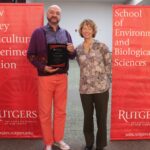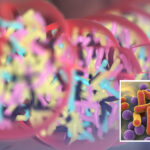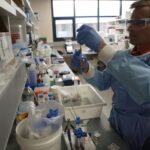On November 19, faculty, staff and students attended the 27th and 28th annual Celebration of Excellence for the School of Environmental and Biological Sciences and the New Jersey Agricultural Experiment Station held at the Cook Student Center. After the pandemic put a pause on fully celebrating the 2020 awardees, it was important to include them […]
Biochemistry and Microbiology
Assistant Teaching Professor Ines Rauschenbach Receives Presidential Award for Excellence in Teaching
Ines Rauschenbach, assistant teaching professor in the Department of Biochemistry and Microbiology, received The Presidential Award for Excellence in Teaching, which is awarded annually to non-tenure-track, full-time faculty members in the arts and humanities, sciences, and social sciences who have demonstrated outstanding teaching skills in classroom instruction, clinical instruction, curriculum development, or mentoring. She is among […]
Navigating the Human Microbiome
SEBS faculty members help pioneer groundbreaking studies. Last year, Rutgers announced its list of 12 Big Ideas—world-changing, multidisciplinary research projects that address critical issues of our time—in areas such as public health, climate resilience, social justice, access to education, the human microbiome, artificial intelligence, and more. The Big Ideas initiative was first unveiled in 2018 as […]
Rutgers Alumnus Paul Orbe (CC’94) Receives Fulbright Award
On August 31, the U.S. Department of State and the Fulbright Foreign Scholarship Board announced that Paul Orbe (CC’94), an-award winning teacher, has received a Fulbright Teachers for Global Classrooms Program award. He teaches Honors Chemistry and Forensic Science at Union City High School in New Jersey. Orbe has a bachelor’s degree in biochemistry from […]
Beneficial Bacteria Can Be Restored to C-Section Babies at Birth
Babies born by cesarean section don’t have the same healthy bacteria as those born vaginally, but a Rutgers-led study for the first time finds that these natural bacteria can be restored. The study appears in the journal Med. Professor Maria Gloria Dominguez Bello is the senior author of the new study. The human microbiota consists of trillions […]
Rutgers University Microbiome Program Will Examine the Interactions Among Microbes and Their Hosts
Editor’s Note: This article first appeared in the Spring 2021 issue of Rutgers Magazine in the feature titled “Thinking Big” Rutgers Big Ideas—an initiative of 12 bold projects with global implications—will draw on the university’s academic, health care, and research expertise to make the world a better place. For more than 250 years, Rutgers has […]
SEBS First-Generation Students Get a Leg up Through Academic Mentoring Class
Knowing how to launch and navigate a successful college career is challenging even for the most astute students. For students who enter academia with little knowledge of what to expect, college can feel like a quagmire. This is often the case for first-generation students – those who are the first in their immediate family to […]
Max Häggblom Recognized with Federation of European Microbiological Societies Special Merit Award
Max Häggblom, Distinguished Professor and Chair of the Department of Biochemistry and Microbiology, is one of two long-standing editors-in-chief honored with a Federation of European Microbiological Societies Special Merit Award for his extraordinary support of students and early-career researchers in addition to his ongoing efforts in growing the impact of the journal, FEMS Microbiology Ecology. This […]
Rutgers Researcher Invents Microbiota Formula to Help High-Risk Patients Fight COVID-19
Clinical trial approved by the FDA starting in February A Rutgers scientist has invented an early treatment for COVID-19 to prevent severe complications and hospitalizations in patients with prediabetes and diabetes by increasing beneficial bacteria in the gut and reducing organisms that cause coronavirus. The treatment – created by researcher Liping Zhao – was given […]
Rutgers Co-sponsors Global Microbiome Network First Latin American Symposium
The first Global Microbiome Network Symposium was launched by Rutgers University, Peruvian Universities Cayetano Heredia, and Universidad Catolica and the Microbiota Vault – a global non-profit initiative to conserve long-term health for humanity. The virtual symposium, held January 15-17, brought together local and foreign scientists that lead the fields of microbiology, anthropology, ethics, public health and bioinformatics, to teach, learn and discuss the importance of conservation efforts on […]









